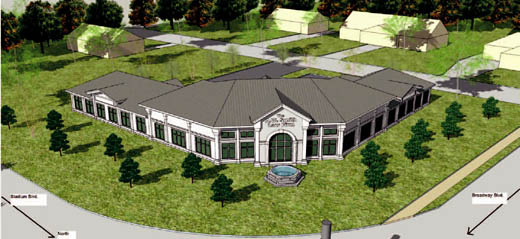Office project faces neighborhood opposition
by Jacob Barker
October 15, 2010


Smith, however, sees a higher use for the corner of an intersection that 40,000 cars pass every day.
One of Smith’s longtime goals has been to build his own office in Columbia, but his proposal for an office building on the residential site, which the City Council will consider on Monday, has generated opposition that threatens to derail his dream.

Smith, a personal injury attorney who has practiced in Columbia since 2008, wants to get the lot rezoned, knock down three houses and build a 7,000-square-foot office building. With plans to hire another attorney soon, he wants to move his practice, the A.W. Smith Law Firm, to the new building and lease out the remaining space.
The houses on the corner have been in poor condition for years, and when Smith went shopping for a place to build, that was the first spot he looked. It took some effort to get in touch with the owner, he said, but after acquiring all the parcels this spring, he quickly went to work putting together a plan. Leawood Plaza will be a significant upgrade to one of the first corners out-of-towners see as they enter Columbia from Interstate 70, he said, and a “landmark that Columbia can take pride in.”
“This is the gateway to our city,” Smith said. “It needs to look nice.”

“Take developments as a whole; a lot of developers put the almighty bottom line at the forefront of considerations for development,” Smith said.
He is also leaving in 40 percent of the land as green space, 15 percent more than the city requires. There will be park benches and a sidewalk, too.
“This is a unique, unique piece of property,” Smith said. “This is not your average, everyday piece of development.”
Residents contend that’s the problem; it doesn’t fit with the environment.
“The design right now is kind of monumental,” said Bourne Avenue Neighborhood Association Vice Chair Brett Grill.
Opposition quickly coalesced from all over the area. Neighbors would prefer to see the corner remain residential. And those close to the proposed development aren’t the only ones. The city has received 30 opposition letters from the neighbors and nearly 100 from people not in the neighborhood.
“The reason we were able to get so many signatures is because (the proposal) represents a broader problem: that commercial development is given priority,” Grill said.
Like Great Hangups, residents of the adjacent Bourne Avenue Neighborhood Association have gathered enough signatures to file a protest petition against the development. That means the City Council will have to pass the measure with five votes rather than four.
But Smith’s project has gotten a favorable review from the Planning and Development Department. The Planning and Zoning Commission voted 6-3 to recommend approval if the footprint was reduced to 6,500 square feet and medical office uses were prohibited so traffic volume stays low, the biggest concern among neighbors.
“The corner is not feasible for residential property anymore,” Smith said, a sentiment echoed by planning commissioners at the project’s hearing.
Smith said that his development has already made numerous concessions to the neighborhood, and the redevelopment of the old, decrepit houses on the corner will improve it. He has also committed $10,000 to the city for traffic calming devices such as speed bumps, a response to protests from nearby residents that traffic will have to use Bourne Avenue to access the building. He still wants medical uses allowed for tenants such as private physicians and dentists but has indicated he will cap the space they can lease.
Grill said Smith has been uncooperative. He calls the $10,000 sum a “PR stunt” and said the fact that Smith is still asking for medical use despite P&Z’s recommendation shows “the lack of cooperation we have gotten used to.”
When the process began, Smith planned to keep one of the three houses intact to serve as a buffer between the neighborhood and the building. However, in the initial meeting with residents, they indicated they would rather have a green space there. Smith came back with plans that had green space, but residents weren’t satisfied.
Grill said Smith used the opportunity to enlarge the building footprint; a more appropriate size would be around 4,500 square feet, he said. And Grill contends the green space is too small to be enjoyed by the neighborhood.
Smith is committed to building his office. Even if it is voted down, he said he will try again to get a development approved.
Should the project get the go-ahead Smith doesn’t foresee any trouble leasing the offices. In fact, he has already had inquiries. But he might one day be the sole tenant, he said. The 34-year-old attorney has already won multimillion-dollar settlements for his clients, and he has only been practicing for eight years.
“If my law firm continues to grow as it is, in five, 10, years, it could probably occupy the entire building,” Smith said.


